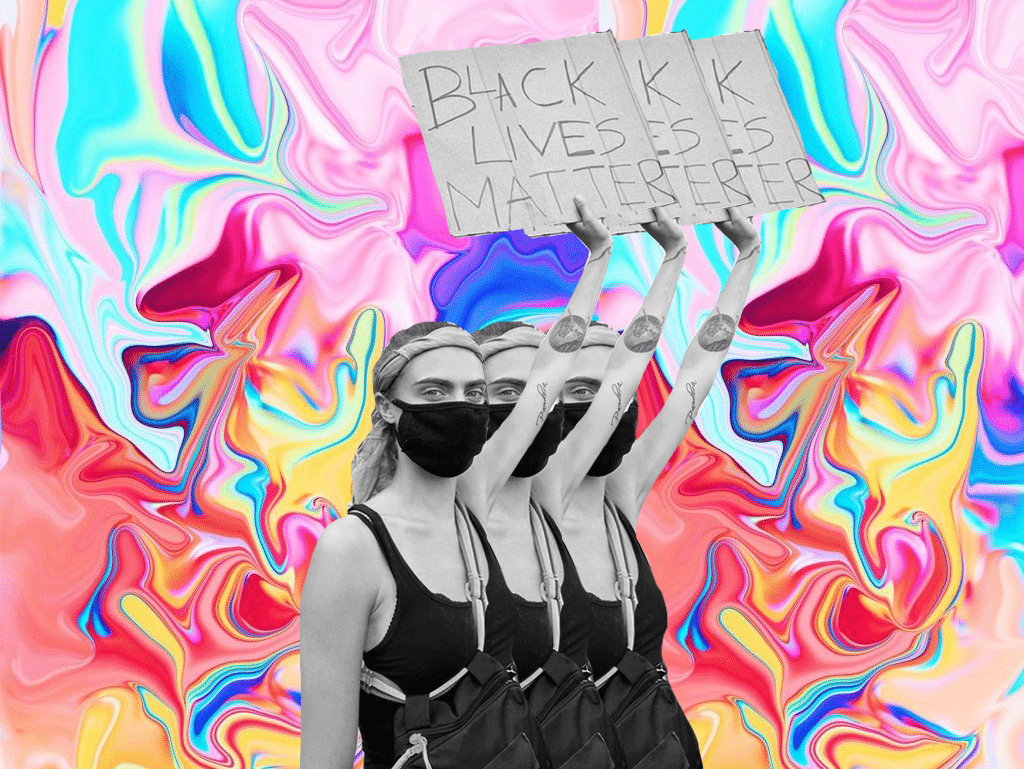
As I scroll down my Instagram feed flooded by a series of political infographics and pictures posted by some of my favourite influencers, I catch myself wondering, why am I waiting for the likes of Charli D’Amelio and Ariana Grande to offer political commentary? Why do I expect online creators to talk about their political beliefs? For me (and a lot of other Gen Zs), the line between pop culture and politics has become blurred.
Since the rise of Black Lives Matter, the #MeToo movement, and COVID-19, social media has become the space for political activism, leaving online creators with a whole new set of responsibilities and pressures. Today, audiences expect their favourite social media creators to speak on political issues, and if they don’t, they are cancelled. I can’t help but reflect… how did we get here?
“Woke” Culture
Recovering from the Trump presidency, facing systemic racism, the climate crisis, and a global pandemic, improving our political future by staying woke is a task Gen Z has taken very seriously. Wokeness; meaning to stay aware or “awake” to political and social injustices, originated with African American activist groups fighting racism and oppression in the early 20th century. However, the colloquialism, “staying woke” only entered the Gen Z vernacular in 2014, at the birth of the Black Lives Matter movement.
While wokeness has different connotations across the political spectrum, Gen Z’s ideologically left-leaning political consciousness associates “being woke” with progressiveness. As President and executive director of nonprofit Rock the Vote, Carolyn DeWitt told Teen Vogue, “(Gen Z) is a particularly liberated generation…They’re rethinking and reimagining systems and institutions and terms and even ideas.” With a tendency to question political norms, Gen Z’s worldview is under-represented in traditional media; and as the first generation of digital natives, it is no surprise that Gen Z has turned to social media for political discourse.
With those under 25 making up a majority of YouTube and TikTok audiences, social media influencers are bearing the brunt of “woke culture.” Throughout the Black Lives Matter protests last year, it was virtually unthinkable for an influencer to post without commenting on the movement.
What was particularly remarkable about this response to BLM was that criticism was not isolated to a single social media platform. We saw TikTokers, YouTubers, and even traditional celebrities critiqued by the public for staying silent. This led to a number of celebrities disabling their comment section because of the backlash, namely the Kardashian-Jenners.
For me, the 2020 Black Lives matter protests marked the end of an era. Led by Gen Z, we witnessed a shift in the function of celebrity. Fame is no longer only about the “glitz and glam,” but about actively making and promoting change.
The Personalisation of Social Media
“Woke” culture as our political mainstream has coincided with a shift in some of the most popular content on social media platforms such as YouTube. With creators like James Charles and Jeffree Star cancelled, audiences are moving away from polished and perfected makeup tutorials to something more “real” and “personal.” Popularised by Emma Chamberlain, we have witnessed the rise of a more “relatable” YouTube. The classic Emma Chamberlain vlog is almost like watching a “Close Friends” Instagram story. She wakes up, drinks a cold brew, cooks a meal, does her skincare routine and closes out her video with a forehead kiss. As she invites us to share in the mundane tasks of everyday life, the appeal of Emma’s vlogs is that her life could be your own. She has tapped into something that every Gen Z girl craves; representation and authenticity.
Although I’ve never met Emma Chamberlain (or anyone like her, for that matter), I feel like she is a friend rather than an influencer. Of course, feeling like you’re friends with a celebrity is not a new phenomenon. Originating in the 1950s, the psychological concept of “parasocial interaction” refers to a relationship experienced by an audience in their encounters with celebrities in mass media. With creators like Emma sharing intimate thoughts and details about their lives, the intensity of parasocial relationships has only deepened since the rise of social media.
Even though the relationship is an illusion, the feelings a viewer has around it are genuine. After reading any influencer’s comments section, it’s fair to say that intense feelings of affection exist toward social media creators. While the love and support for influencers can create a real sense of belonging, the unfortunate flip side is betrayal. By placing these influencers on a pedestal of friendship, when creators say or do something “problematic,” viewers suffer real feelings of loss and anger. In a social media landscape informed by “wokeness,” our expectations of creators often creates a politically volatile space.
So, Can Influencers Be Apolitical?
At the risk of sounding like a typical Gen Z, I think it is safe to say we have passed the age where social media influencers can be apolitical. The rise of “relatable” YouTube and Gen Z’s commitment to “wokeness” has created the perfect storm for the politicisation of social media.
As we continue to see pressure on social media influencers to speak out about political issues, whether it be BLM, Stop Asian Hate, or even the Israel-Palestine conflict, it is worth thinking about how we, as audiences, can challenge social media influencers to use their platforms for good without feeding into the anarchy of cancel culture.

